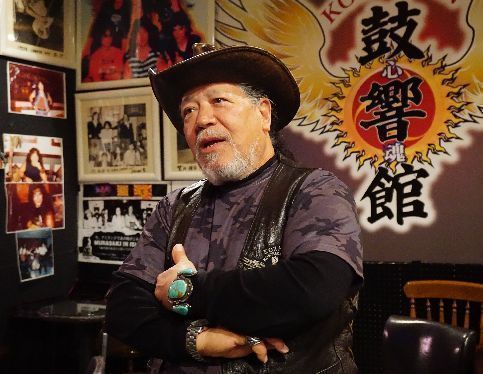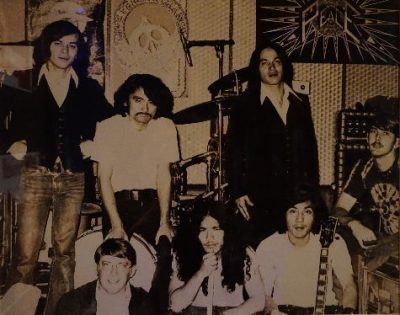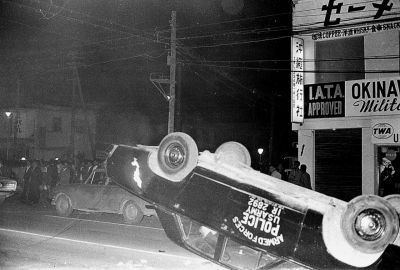“I understood how both the Uchinanchu and U.S. military felt.” Okinawan musician who grew up down the street from military base shares his story on the 49th anniversary of the Koza Riot

Eiichi Miayanaga describing the Koza Riot. December 14, 2019 at the Cannon Club live music house in central Okinawa City
December 20, 2019 Ryukyu Shimpo
By Mikako Shimoji
Okinawa – The air was thick with the smell of smoke, and the people were filled with anger.
On December 20, 1970, 49 years ago, in an angry response to a U.S. military member causing a traffic accident as well as the response to the military police’s handling of the accident, Okinawans in Koza (modern day Okinawa City) set fire to cars in what is known as the “Koza Riot.”
Eiichi Miyanaga, 68, the drummer for the rock band “Murasaki” was a witness to the riot. At the time of the riot, Miyanaga was playing a concert for U.S. military personnel.
“I understood how both the Uchinanchu and U.S. military felt,” he said while reflecting on his conflicted feelings, and that even today his rock music resonates with his love for freedom and peace, without forgetting Okinawa’s post-war history and culture.
Miyanaga grew up in Koza, and started playing in bands after graduating from junior high school.
At the time of the riot he was 19 years old, working at a bar down the street from the gate to Kadena Air Base called “Astor House.”
Almost all of the patrons were U.S. military. It was at the height of the Vietnam War, so there were a large number of Americans his age from all over the United States gathered in Okinawa on their way to the battlefield.
“They would drown themselves in alcohol, and turned to music to let out emotions that had nowhere else to go.
When the day of their deployment would draw near, you could see the change in their eyes, even from the stage.
There were no soldiers that were looking forward to going to war.”
This is how Miyanaga remembered the figures of these young men who were being pressed into war against their will.
Then, in the early hours of December 20, 1970, there was an incident near the bar where his band had just finished playing for the soldiers.
While returning home, he came across the scene of a traffic accident caused by a U.S. soldier.
Tempers were flaring, and people were starting to rock the car, but he though, “It wouldn’t go much further than that,” and returned home.
It was late, and time to go to sleep. Then he heard a long “Bang!” and thinking that something major was going down, ran out of the house.
At Shimabukuro crossroads, Okinawan police and U.S. military police were facing off against the people who had gathered there.
Because of his job playing music at bars with mostly U.S. military patrons, he did not join in with the rioters.
Even so, “I could understand the anger from the Uchinanchu.”
While Miyanaga’s father was U.S. military and his mother was from Tokunoshima, he identifies as Uchinanchu.

Miyanaga (front row, center) with his bandmates around the time of the riot
His father was deployed to the Korean War, and his mother was very busy, so he was often looked after by a woman in the neighborhood from Naha.
The woman, who Miyanaga called “Auntie,” loved him as if he were her own child.
He had also experienced discriminatory treatment by U.S. soldiers.
“From the point of view of the white soldiers, I was colored. There were many times where I felt inferior.”
One of the cars burned in the riots belonged to one of his regular customers.
After the riot the soldier came to the bar disheartened, “They were beaten down. For something like this to happen in Okinawa…” Miyanaga reiterated his feelings at the time, “I understood how both the Uchinanchu and U.S. military felt.” After the riots, the U.S. military restricted leaving the base for U.S. military personnel and their families.
This put a strain on business that catered to U.S. soldiers.
Forty-nine years has passed since then.
The town of Koza passed through things like the reversion to Japan, and has been gradual decline.
Miyanaga worries about the post-war history and culture being forgotten.
“We cannot simply put a lid on history. History needs to be studied to pave the way for the future.”
Miyanaga reopened the Cannon Club in March this year on what used to be called BC Street (now Park Avenue), and continues to play rock music.
The club specializes in songs from the 60’s and 70’s, the songs that soldiers on their way to war would have requested at the time.
Many of the tunes sing of freedom, peace, and love. “Let’s bring the chorus of peace and love to the world from Koza.”

An American MP vehicle overturned by outraged Okinawans during the riot. December 20, 1970 on military road 24 (now National Route 330) in Koza
The Koza Riot
From the early hours of December 20, 1970 through the morning Okinawans overturned and set aflame cars belonging to U.S. military police and other U.S. military personnel on military roads 24 (now Japan National Route 330) and 20 (Kadena Air Base gate road, now Okinawa Route 20) in the city of Koza (now Okinawa City).
Anti-U.S. sentiments stemming from U.S. rule of Okinawa were already high from incidents such as a U.S. soldier being acquitted of charges after killing a housewife in Itoman in a hit-and-run earlier that year in September, and a protest in Misato (now Okinawa City) demanding the removal of poison gas.
(English translation by T&CT and Sam Grieb)
Previous Article:Editorial: It has been one year since the start of land reclamation in Henoko. Japan should end construction Henoko and close MCAS Futenma
Next Article:Showing Friendship in Ryusou and Chima Jeogori An Event on Kokusai Street, Okinawa The Tourism Industry Amid Worsening Japanese-Korean Relations
[Similar Articles]
- Student researches history of black soldiers’ community in Koza
- Okinawa City provides free 3D app “Koza Riot”
- A-Sign Story: Enthusiastic depiction of Okinawan Rock
- Rock musician Kat-chan receives Okinawa Cultural Merit Award
- Okinawan rock star closes his live music club in front of Kadena Airbase
 Webcam(Kokusai Street)
Webcam(Kokusai Street)


